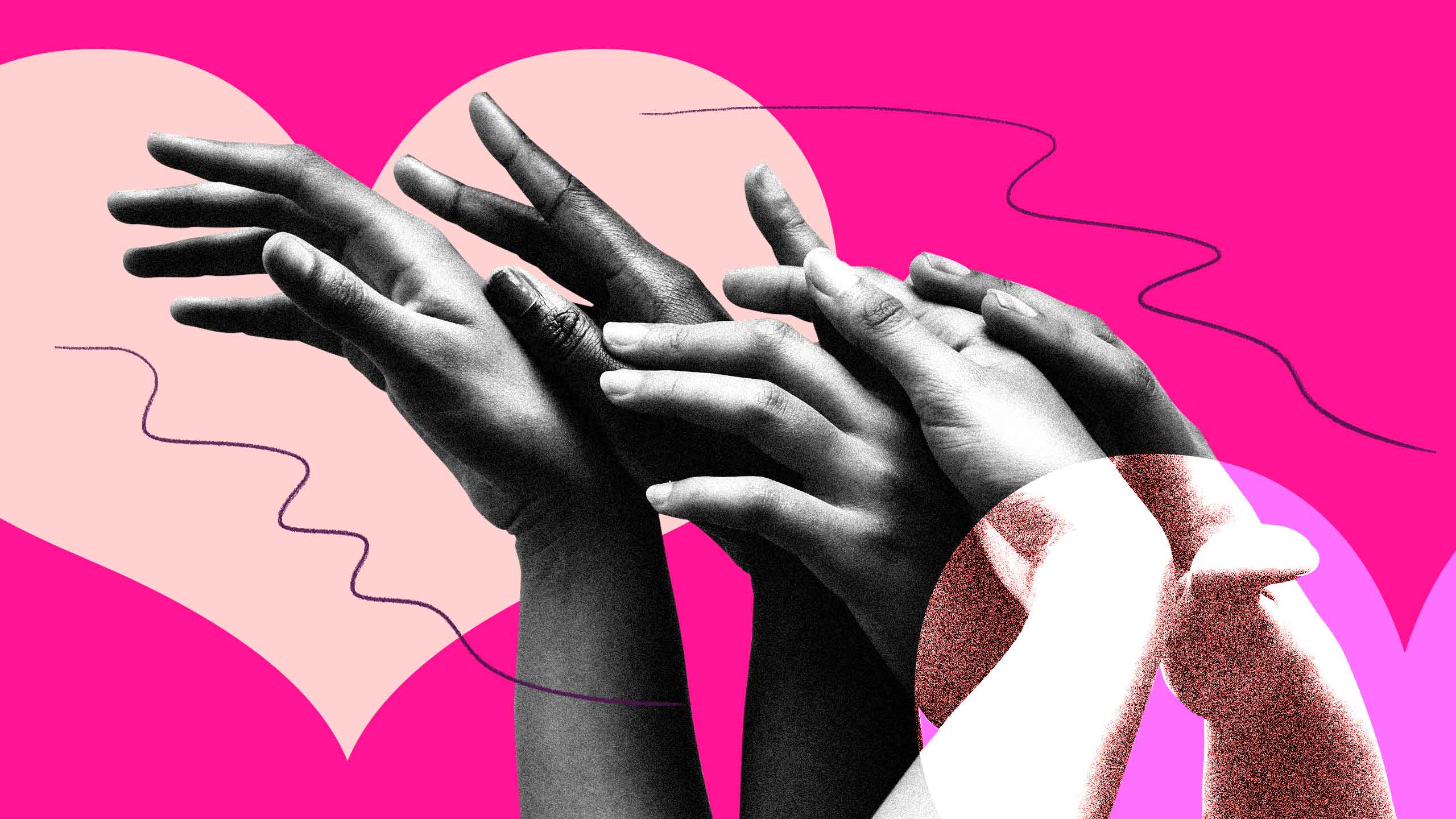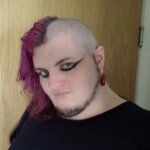I proudly describe myself as a polyamorous slut—I love a lot of people and I fuck even more.
But COVID-19 has changed my life—all of our lives—forever. The impact of the pandemic itself, and the ways we’ve responded to it, affects us all in countless ways. For me, that includes my approach to dating.
Prior to the pandemic I went on a lot of dates, had light-hearted flings and loving romantic relationships. Lazy afternoons spent reading together over coffee, nights dancing in queer bars and filthy hookups where sucking cock in the bathroom was just an advanced form of flirting. I was living my best gay life when lockdown restrictions first came into effect—and then all of that came to a stop overnight. I was lucky that I moved in with my then-girlfriend (now fiancée) back in February 2020. While I was missing the freedom to physically be with my many loves, I wasn’t suffering from the level of isolation that many people faced during lockdown.
After that first big change came many more. I live in Leeds in the U.K., and we’ve had 15 months of restrictions loosening, tightening back up, then loosening again. I adapted to working from the tiny flat I share with my fiancée and staying in every night. My dating life adjusted to these new rhythms as well. Relationships that would normally take place in the real world moved online: Zoom dates, sexting and soppy late-night messages became the new normal. As someone who grew up with the internet, I’m a firm believer that the friends and relationships you build online can be as meaningful and important as those forged face to face. But while these connections can be as fulfilling as those made IRL, they certainly aren’t the same; the format through which you get to know people changes what you know about them. For me, flirting online involves a combination of memes, emotional vulnerability and eye wateringly explicit descriptions of what we’d like to do together. I might not know what a partner’s laugh sounds like, but I do know how to make them giggle and blush with a well-picked video.
At various times, COVID-19 restrictions lifted enough to start meeting in person once more, and my approach to dating shifted yet again. There were occasions when I was able to see people and have conversations in person. But both how and where I met people had changed from my pre-pandemic routines: smouldering desire was restrained by physical distancing, my eyes caressing curves I knew I couldn’t touch. That’s bad enough when you’re just a horny mess, but being a queer person added another layer of difficulty.
“Buried deep inside me is a little voice that says being openly queer is something I should be ashamed of.”
We have all, to some extent, absorbed the queerphobic messages that shape wider society. As a queer person, recognizing and undoing this internalized bigotry can be a lifelong journey. For me, one form that this took was a fear of public intimacy. Buried deep inside me is a little voice that says being openly queer is something I should be ashamed of. Every public display of intimacy with my queer partners is in defiance of that queerphobia, a way of using pride to fight my internalized shame. Yet during the pandemic, touching in public became largely forbidden. On a logical level I know that this is a sensible measure to reduce the spread of the novel coronavirus. But subconsciously, it reinforces that internalized message that touching the people I love in public is wrong; that visceral gut feeling that you should not, must not, show your queerness in front of strangers.
That feeling, which I thought I had dealt with years ago, began to creep back into the periphery of my mind. Over the years I’ve found ways to quiet that voice—the little piece of the queerphobic patriarchy that lives within me—and public intimacy was one of the main ones. It was only when I was no longer able to use the touch of a lover to stifle this shame that I realized the shame was still buried within me. Perhaps I will always have this self-hatred, the irreversible effect of the culture I grew up in. All I can do is fight, battle day after day with both internal and external queerphobia and shame.
While I was unable to touch my lovers (and as I worked through that resulting resurgence of shame), something else had changed about my dating life: the places where it happened. Normally, I’d meet my partners in gay bars, queer coffee shops or other spaces where it’s safe to be openly queer. But when these alcoves of acceptance closed, I was pushed into (non-queer) public spaces—and for many LGBTQ+ people, that can be dangerous. Queer people are much more likely than most to face public harassment or violence. For me, this danger is compounded by being fat and visibly trans; things are even worse for people who are also members of other marginalized communities, like BIPOC and disabled queer people.
And yet, there is something special about taking up space as a queer person. Pride marches are a way in which the whole LGBTQ+ community comes together and declares that we will not be cowed, we will not be quiet and we deserve to be seen. For all the debates around the contemporary commercialization and sanitization of these events, taking up public space by being visibly queer or trans is still a powerful act. And this defiance doesn’t just happen in parades; any time that I’m shamelessly queer in public it is a political act. Going on dates in public may not have been my choice, but it can still be a radical act of resistance in a queerphobic society. Perhaps this isn’t the most romantic way to think about a date, but it certainly doesn’t feel like a bad thing.
“I long to hold a partner in my arms, and feel the warmth of their body pressed against mine.”
The main thing that dating through the pandemic did was force me to recognize and re-evaluate my priorities. Fifteen months away from my old dating routine made it painfully clear what was really important to me—and it turns out that sex is less important than I thought. Don’t get me wrong, I am definitely still a horny little minx in the right circumstances. But what I long for is not the quick release of a casual fuck. It’s not the flings, that heady excitement of meeting someone on an off chance and feeling the unexpected spark of chemistry. That can be fun in its own right, but I don’t feel its loss as keenly as I assumed I would.
What I yearn for is intimacy. I long to hold a partner in my arms, and feel the warmth of their body pressed against mine. I want to run my hands over their hair (or scalp) and feel connected to somebody I love. And when I fuck, I want it to be with an intense hunger that burns through my soul. A need to claim and be claimed in turn, a need for sex which transcends the simple pleasure of the physical act and touches on a deeper connection with my partner. I’m so lucky that I’ve still been able to share this loving intimacy with my fiancée—if anything, that’s affirmed how much I yearn to share this with my other partners as well. This pandemic has destroyed so many lives and overshadowed us all, but if I can find a silver lining to the choking cloud of toxic smog, it did push me to better understand myself.
I worry a little about how I’ll react when things open up further, when restrictions are lifted entirely. Change is always a little scary; after all, we are creatures of habit, and it takes time to adapt to changing circumstances. I worry that I’ll have forgotten how to interact with people in person. It feels like I might regress to my painfully awkward teenage self. Or it could go the other way, all sense of moderation going out of the window as I chase the fleeting thrill of filthy hookups and casual flings. I don’t want to throw away the deeper connections I’ve forged during lockdown, so I need to keep my adjusted priorities in mind. The pandemic has helped reveal what’s important to me, and I need to remember what I found—to make choices which prioritize building intimacy over fleeting thrills.
For all the talk of “getting back to normal,” there’s no going back to how things were. We fundamentally changed the way we lived for more than a year, and that’s going to have long-term effects. The best we can do is take the lessons learned through the pandemic and use that knowledge to find a better path, reflect on what we’ve missed in the past year and let that knowledge act as a guide. I hope that when restrictions lift and my dating life returns to a less restricted state, I will remember what I learned from this miserable pandemic. Perhaps I’ll take things a little slower, prioritizing building emotional connection and intimacy over rushing into a quick fling.
“Sitting together in a space designed for queer people like us, our conversations no longer mediated by Zoom, I felt love fill my heart.”
I know I’ll be more grateful for the safe spaces where I can meet with my partners, and mindful of how and where we queer public spaces. In Leeds, restrictions have already started to loosen—the reopening of Flamingos, a local LGBTQ+ coffee shop, brought tears in my eyes. I sat across the table from a partner, devouring their presence as we drank our coffees two metres apart. As much as I longed to touch them, it was still one of the happiest moments in years. Sitting together in a space designed for queer people like us, our conversations no longer mediated by Zoom, I felt love fill my heart. It felt like the first drop of rain after a drought, and I hope I never take those moments for granted again.
My dating life completely changed for 15 months and counting. That sucked, and there is no undoing the freedom and joy I lost in that time. All I can do is learn what I can, and try to use those lessons to make the future better than the past.


 Why you can trust Xtra
Why you can trust Xtra


